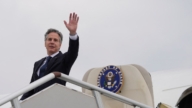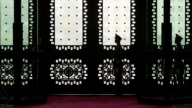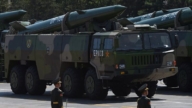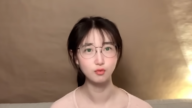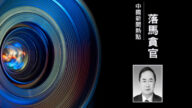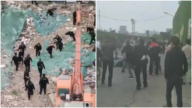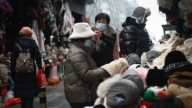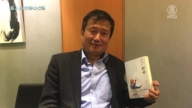【新唐人2014年03月05日讯】中共喉舌《环球日报》3号发表社评抱怨:为何提敏感问题是境外记者的“特权”。《环时》还把这种“不公”,提到有损中共媒体公信力、和国家软实力的高度。这篇罕见的另类社评,引来中国网友的讨论。
《环球日报》抱怨境外记者“特权”一说,源于香港《南华早报》在政协会议新闻发布会上,提问有关前中共政法委书记“周永康事件”,并得到政协发言人吕新华近乎肯定的回复:“你懂的”。
3月3号《环球日报》发表社评抱怨:提敏感问题为何是境外记者的“特权”。
社评说,“两会”让中国公众看到了国内记者在境外同行面前的“弱势”,展示了境外特别是西方记者的“强势”和“客观”。因此对普通中国公众来说,后者(西方记者)“更像记者”。
社评认为,这是“中共软实力的一个困局”,当局针对敏感问题的现行做法,在维护一件件具体事情顺利的同时,却伤及了国家主流媒体的公信力。
《环球时报》罕见的另类社评,在网上引发议论,有网友讥讽:“为何境外记者有‘特权’你懂的”
有网友回应:“因为境外记者没有练过叼飞盘。”所谓“叼飞盘”,是指人和狗玩的一种游戏,主人扔出的飞盘,狗总能第一时间给叼回来。
《环球时报》的报导因为长期配合中共的指令,因此一直被中国民间讥笑为“叼飞盘”,《环时》还因发表《媒体应是国家利益的“看门狗”》一文,被网民戏称是“党的看门狗”。
时政评论员汪北稷指出,《环球时报》长期被网友冷嘲热讽,甚至被称为“没有思想的墙头草”,如今为了周永康这种抢风头的新闻,竟然要重拾节操了。
时政评论员汪北稷:“实际上像类似于环球时报、包括人民日报,中共官方的,特别是共产党直属的这些媒体,不能称为真正的传媒,只称之喉舌,所以它们最最缺乏的就是:传媒的精神去探索,独立调查,发表自己的声音。”
汪北稷分析,《环球时报》作为中共的发声筒,它以为在中共得天独厚支持下,能在新闻界独占舆论鳌头,但在一些新闻报导上,被主子扼住咽喉,也只能发发牢骚。
汪北稷:“中共对媒体控制,不光是中国大陆的,还有香港的,还有西方媒体在北京的,它都是采取控制和恐吓的手法,如果说西方媒体在它的所谓两会上,问出了一些很尖锐的问题,它就会取消他的签证,限制它的活动空间,封锁他的网站。”
去年美国《纽约时报》和《彭博社》,因不断报导中共领导人家族敛财,曾一度被中共当局封锁。去年底,两家网站的24名驻北京记者,更被中共拒签入境。
3月2号,中共“两会”召开前夕,《人民日报》发表评论,呼吁两会代表们不要沉默,要负起责任。作为政协委员的《央视》名嘴崔永元回应说:我们敢发言,你敢发布吗?
原《河北人民广播电台》编辑朱欣欣指出,由于中共没有明文规定哪些是所谓的敏感话题,人们在公共场合的言论,或者让官员难堪的话题,都可能被当作敏感话题遭打压。
原《河北人民广播电台》编辑朱欣欣:“你光说让大家讲真话,可是讲真话之后,受到打击报复,穿小鞋这就不行,你得让大家有一个讲真话的环境,首先是你们当领导的,当局的应当有这么一个鼓励的机制和保障的机制。”
汪北稷指出,中共一方面叫政协、人大多提尖锐的问题,一方面又把一些敢发声的人关进牢里。
汪北稷:“所以《人民日报》号召它的政协、人大的这些代表去讲真话,完全是虚伪的号召,而这些人大、政协的人士即是既得利益者,清清楚楚看到中共执政60多年来‘因言获罪’残酷的现实,绝对不敢讲真话。”
汪北稷指出,政协、人大只是“橡皮图章”,他们只能在中共划定的范围之内,去提一些环境、雾霾等皮毛问题。像政治权力,公民利益,国家体制等,他们绝对不能提也不敢提。
采访编辑/李韵 后制/陈建铭
State Media Humiliated in Front of Overseas Journalists
The Communist mouthpiece Global Times editorial complained
on March 3, that overseas reporters have the privilege to ask
sensitive questions.
It also reported that this unfairness damages the credibility of
Chinese media and the state’s soft power.
This rare event and odd style of commentary by the Global
Times is being discussed by the Chinese netizens.
The “privilege" complained of by the Global Times originated
from the question posed by Hong Kong’s South China Morning
Post at the press conference prior to the National People’s Congress,
It regards the Zhou Yongkang case, and the subsequent response by
the spokesman Lu Xinhua, “You understand."
On March 3, Global Times editorial complained that overseas
reporters share the privilege of being able to ask sensitive
questions.
The editorial stated, that the parliamentary meetings demonstrate
the vulnerability of domestic Chinese reporters in front of overseas
reporters, whose strength is objectiveness.
To the general Chinese, overseas reporters, especially the
Western reporters behave more like “reporters.”
The editorial commented the dilemma ofthe CCP’s soft power,
while the authorities proceed, the sensitive issues are monitored
and the domestic mainstream media’s credibility has been damaged.
This rarely seen and odd editorial from Global Times caused
netizens’ discussion.
A netizen ridiculed: “Why do overseas reporters have ‘privilege’?
You understand."
Another netizen responded: “Because overseas reporters have
never practiced ‘go fetch.’”
Global Times have long been known to take orders from the CCP
in reports and is ridiculed by the public as ‘go fetch.’
Global Times has also been nicknamed as the ‘Party Watchdog’
for its previous editorial entitled, “Media should be the ‘watchdog’
of state interests.”
Commentator Wang Beiji indicates that the Global Times has long
been criticized by Chinese netizens as the “the mindless bending
weed,” trying to claim its ethics over news on the Zhou Yongkang
case.
Commentator Wang Beiji: “In fact, none of the state run media
such as the Global Times, the People’s Daily, the ones directly
under the Communist Party are worthy of the title.
They are simply the Party mouthpiece.
They lack the spirit of genuine media to conduct or explore any
independent investigation, or expression of their opinions."
Wang Beiji analyzes that the Global Times had wanted to
monopolize opinion with the blessing and support of the CCP,
but was only strangled by the CCP.
Its reports can only lead to some complaints.
Wang Beiji: “The CCP controlls with the tactics of threat to
media domestically, in Hong Kong, as well as the West.
Any tough questions during parliamentary meetings will cause
the foreign journalist’s visa being revoked. They are also subject
to restricted and limited activities and Internet access."
Last year, reports on the money grabbing CCP officials’ families
had both the New York Times and Bloomberg blocked.
Late last year, 24 reporters of these media in Beijing were refused
a visa.
On March 2, prior to the CCP’s Parliamentary meetings, People’s
Daily editorial called on the Congress to speak up and take
responsibility.
CCTV talk show host, Cui Yongyuan, also a member of the
Political Consultative Conference, responded: We dare to speak,
but do you dare to publish?
Former editor of Hebei People’s Radio Zhu Xinxin says that:
without a clear definition of the so-called sensitive issues, any talk
in the public or challenge to the officials could be regarded as
sensitive and suppressed by the CCP.
Zhu Xinxin, former editor of Hebei People’s Radio: “You can’t
just ask people to tell things and then punish them for telling.
The environment to tell things, the authorities, especially the
leaders, need to provide mechanisms to encourage and safeguard
the environment for telling things."
Wang Beiji comments that the CCP told the Congress to raise
tough issues, but also put those who dared to talk in jail.
Wang Beiji: “People’s Daily call for Congress to speak-up
is simply hypocritical.
Those Congresses are the vested interests, they have learnt it well.
For more than 60 years of the CCP ruling, the cruel consequences
of daring to talk have taught them not to talk."
Wang Beiji says that the Political Consultative Conference and
the National People’s Conference are just two rubber stamps.
They are only allowed to speak on some superficial questions
such as the environment, the smog.
Anything such as political rights, citizen’s benefits, or
the state system, is not and can’t questioned.


